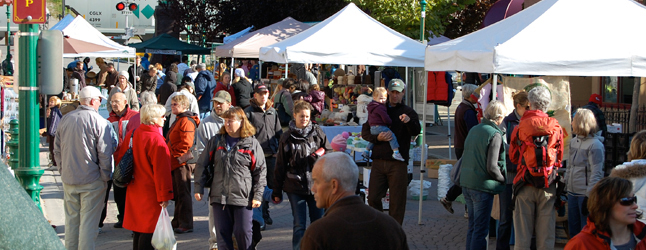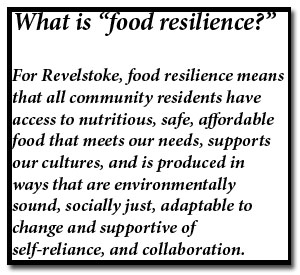

Current Publisher and Editor
It’s safe to say that Revelstoke is a community that values food. We value good food, especially food that we have grown, raised, picked or caught and killed ourselves. Food binds us closer to the land and not only it binds us together as families, friends and neighbours. In short, it is one of the most important cultural elements that defines us as a community.
Towards that end, a group of women, and men, have been meeting to craft a Food Charter for Revelstoke. You may have read about those efforts in The Revelstoke Current (Please click here, and here to read previous stories about the Food Charter).
Well the last set of discussions have yielded a draft document that Hailey Ross, Melissa Hemphill, Laura Stovel, Patti Larson and other members of the committee believe is worth offering to the general community for comment.
The discussions leading up to the document below weeded out a lot of politically correct language and overly enthusiastic references to the cultural importance of food. And makes it exquisitely clear that while local government can endorse it, their willingness to do so doesn’t require them to act on any portion of the Charter. If anything, it is a statement about communal principles such as our belief in food security and the importance of supporting local and regional farmers and food producers. A lot of this “motherhood stuff,” which generally mean its is difficult to argue against. Still, it is important to identify these principles, discuss them and enfold them into our local culture.
Note that I say “discuss them.” The ad hoc committee of individuals who drew up this Charter hopes you folks who read will think about it and share your thoughts with us.
Please read the Charter in its entirety. At the bottom is a pre-addressed e-mail form. Please type your thoughts onto the form and fire it off into the cyberspghere. What you have to say is important and will be treated as such.
We know we live in a marvellous community. We think the principles enshrined in this Charter will underline that.
Cheers
Revelstoke Community Food Resilience Charter
From our region’s earliest days First Nations and settlers have fished, hunted and gathered wild food and medicines. Farming and ranching began in the late 1800s and early 1900s as city dwellers maintained backyard gardens. In the 1970s, the reservoir behind the dam at Castlegar drowned the valley bottom increasing our reliance on food sources outside our immediate area.
Today, some of our community’s children and working families do not have reliable access to safe and nutritious food, with an  increasing number relying on the food bank.
increasing number relying on the food bank.
Much of the food we eat today is transported over long distances from where it is grown and processed. This dependence on imported food increases our impact on the environment and our vulnerability to food shortages from natural disasters or economic-setbacks. A growing number of households are responding by returning to the traditions of home gardening, wild food gathering and food preservation.
Revelstoke’s Integrated Community Sustainability Framework commits us to, among other things, achieving climate resilience and a healthy ecosystem, minimal waste, responsible water use, and carbon neutrality. It also urges us to ensure we have a healthy, active population, and a locally diverse economy.
Revelstoke’s Food Resilience Charter presents a vision to benefit our community and provides guidance for actions to achieve this vision. It is based on the belief that a thriving local food culture that celebrates producing locally and eating together will support us in living healthier, happier and richer lives – connected to the land, the growers and each other.
Vision
Recognizing that Revelstoke is culturally diverse, we are committed to strengthening our food resilience to support the economic, ecological and social well-being of the community with:
- Access to nutritious, safe, affordable food as a basic human right for all residents
- Access to food that is sustainably and ethically produced
- Recognizing of the importance of quality food to our health and well-being
- Increasing local and regional food production through personal, business and government actions
- Appreciating the importance of eating together
To create a just and sustainable food system we can:
- Consider potential impacts on food resilience in all government, business and personal decisions
- Improve access to healthy and affordable foods
- Facilitate household and community-based food production and preservation for self-reliance
- Promote bear-aware composting and the preservation of healthy soil
- Encourage responsible and sustainable harvesting of wild foods
- Help to preserve regional farmlands and increase use of arable land for food sustainable production
- Support local and regional farmers and food producers
- See that more food waste is recovered and reused for productive purposes
- Encourage humane treatment of animals raised for food
- Promote food safety
- Identify educational opportunities that promote food knowledge.
Help us. Please give us your feed back:
A Draft Food Resilience Charter for Revelstoke
~ What do you think? ~
A committee of folks interested in Revelstoke’s long-term food resilience have worked together to write a draft charter. We hope to have this charter ratified by our community, and by our City Council.
A Food Charter is a generally agreed upon statement of principles and beliefs about food quality, availability, sustainability, quality and security. It is not a legally binding document but it does encourage communities to think about and discuss food issues.
Note that this charter is not a Food Action Plan where we get to specific projects and actions – that comes next! J If you care to be a part of this process please let us know by providing your contact info on this feedback sheet. Name and contact info: _____________________________________________
What do you like?
What do you not like?
What is missing?
Please click here to download these questions as a Microsoft Word document. You can then fill it out on your computer, save it there then click here to access a pre-addressed e-mail form, attach the completed form and then fire it off to us. We’ll acknowledge receipt of your comments and consider them as we move ahead with this process.



